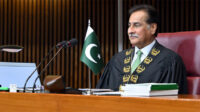Curfew and stringent restrictions entered the 7th consecutive day, today, in Ladakh region of Indian illegally occupied Jammu and Kashmir, as the territory reels under the aftermath of Indian forces’ brutal firing that left four unarmed protesters dead and nearly one hundred injured.
The New Delhi-controlled BJP regime imposed the clampdown on September 24 after Indian troops fired bullets and pellets on peaceful demonstrators demanding full statehood for Ladakh and its inclusion under the Sixth Schedule. Officials said BJP authorities announced that the week-long curfew especially in Leh town would be relaxed for four hours from 10 am today.
Heavy deployment of Indian Army and paramilitary forces continues across Leh and and Kargil districts, with gatherings of more than four persons strictly banned. Internet and communication services remain suspended, choking the flow of information and leaving the population isolated.
Meanwhile, the political crisis in Ladakh has further deepened as the Leh Apex Body (LAB) on Monday pulled out of the ongoing dialogue with the Indian Ministry of Home Affairs (MHA), declaring that “talks can’t be held on gunpoint.”
At the same time, the Kargil Democratic Alliance (KDA) demanded the immediate and unconditional release of renowned activist Sonam Wangchuk and other youth leaders detained after the September 24 violence in Leh. Wangchuk has been booked under the draconian National Security Act (NSA) and shifted to a jail in Jodhpur, Rajasthan.
Addressing a press conference, KDA leader Sajjad Kargili said that the people of Ladakh were being “pushed to the wall” and warned that the Centre’s refusal to grant statehood and constitutional safeguards under the Sixth Schedule was “alienating” the population in the strategically sensitive Himalayan region. He stressed that the demands were “non-negotiable” and called for an impartial judicial probe into the killings in Leh.
Kargili slammed the administration for ordering troops to open fire on peaceful protesters, noting that no such permission had been given when Indian soldiers faced Chinese troops on the border. He said the incident exposed the failure of the BJP-led dispensation to handle the situation democratically.
He further cautioned that Wangchuk’s arrest had amplified the struggle of Ladakhis across India. “Earlier, the protest was only in Ladakh; now you will see protests in different parts of India,” he remarked, adding that the Union Territory status had “failed badly in addressing the aspirations of the people.”






